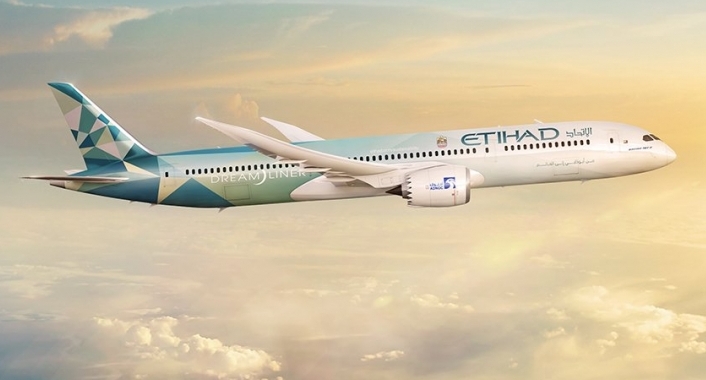Etihad Airways’ B787 to serve as flying lab to test carbon emissions, fuel consumption
Etihad Airways and Boeing have announced that one of its B787 Dreamliner airplanes will serve as a flying laboratory for testing procedures and initiatives that could further reduce fuel consumption and carbon emissions, as a part of growing partnership to advance the sustainable growth of aviation.

November 18, 2019: Etihad Airways and Boeing have announced that one of its B787 Dreamliner airplanes will serve as a flying laboratory for testing procedures and initiatives that could further reduce fuel consumption and carbon emissions, as a part of growing partnership to advance the sustainable growth of aviation.
"Innovation, productivity, and sustainability are core values and objectives of Etihad Airways and of Abu Dhabi,” said Tony Douglas, group chief executive of Etihad Aviation Group, at Dubai Airshow. "The Boeing 787 Dreamliner is a key enabler of all three."
The specially-themed B787 will enter service early next year and operate regular flights in Etihad Airways' network, while periodically serving as a testbed for assessing environmental sustainability initiatives.
"The 787 Dreamliner and its track record of environmental performance make it the perfect platform to advance our industry's commitment to sustainable growth," said Stan Deal, president and chief executive officer of Boeing Commercial Airplanes. "We look forward to continuing our collaboration with Etihad Airways to identify more opportunities to improve efficiency across commercial aviation."
Beyond the environmental testing on the airplane, the two companies will build on the technical capabilities that Etihad Airways has developed while maintaining its own Dreamliner fleet and that of other operators. As part of the strategic partnership, the companies are discussing several areas where they can work together to improve operational efficiency.
Boeing and Etihad Airways also announced that Boeing will provide multiple services for the airline's Dreamliner fleet, including the component services programme, landing gear exchange, and high-value components exchange, programmes that help an airline simplify asset and maintenance management, reduce spare parts costs while improving parts availability. The agreements also include a customised material parts package and three quick engine change (QEC) kits that enable Etihad to quickly return an airplane to service if an engine needs to be repaired or replaced.
"Boeing's global supply chain footprint will allow ready access to parts, support, and services, when and where it's needed," said Ted Colbert, president and chief executive officer of Boeing Global Services. "We are proud to partner with Etihad Airways to increase maintenance efficiency and maintain aircraft operability."
These agreements build upon a history of partnership between the two companies. Both are members of a research consortium to encourage the development of sustainable aviation fuels in the region.


